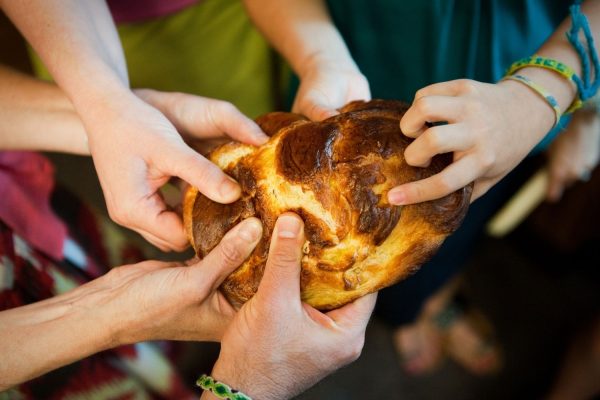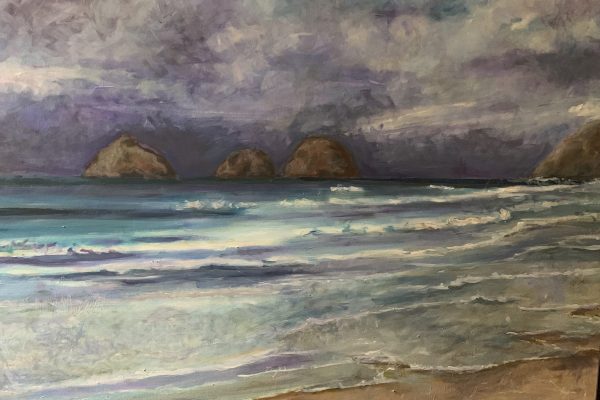Scroll down to the bottom of the page to download the full version of this Avodah Service.
We try to discern the good from the bad. But if we delve deep enough into Being, if we travel in time back to the singularity of our universe’s coming into being, if we try to peer into the future, we find there is only ONE, utter mystery, an aspect of the Divine that can’t be named. When Moses first spoke with God at the burning bush, Moses asked, “Here, I’ll come to the children of Israel and say to them, ‘the God of your ancestors sent me to you,’ and they say to me, ‘What is Its name,’ what should I say to them?” God answers: “I WILL BE WHAT I WILL BE – EHYEH ASHER EHYEH …. Tell them I WILL BE – EHYEH sent me to you.”
Maybe we want more solidity than this ever-unspooling I-WILL-BE offers. Maybe we want more control. But that carries the danger of being tempted to try to control others’ lives, putting ourselves in the service of that great seeker of solidity, the Pharaoh entombed in pyramids, rather than of God.
So let’s follow Aaron, the High Priest into the innermost sanctuary, where we are in the presence of only Mystery. Of EHYEH – I WILL BE.
If you’re comfortable, I invite you to close your eyes. Be settled in your space. Feel your body in its place, held in place by gravity, touching the floor and clothing and air. Attend to your breath coming in and out without needing to control it. On this day of forgiveness, be forgiving with yourself if your mind wanders and just bring yourself back to your breath. You are in the presence, as we all always are, of the mystery of I-WILL-BE WHAT I-WILL-BE – EHYEH ASHER EHYEH. Let’s take a few moments seeing EHYEH with our mind’s eye, hearing EHYEH with our mind’s ear.
A lovely chant of this name of the Infinite One can be found here.
We can’t name the divine, but we must name the divine. We must discern the light of the divine in the world in order to follow that light. We name God and then are able to call on God’s Name for our own salvation.
Indeed, at the Burning Bush, God tells Moses another name, Yod-Heh-Vav-Heh, the name which Jews have pronounced as Adonai for millennia and which has been translated as Is-Was-Will-Be or Causes-to-be.
“That is my name for eternity,” says God.
And after the sin of the Golden Calf, God cannot show Moses the divine essence, but calls out the Name of Divine Compassion:
אֵל, הוֹרֵֽיתָ לָֽנוּ לוֹמַר שְׁלֹשׁ עֶשְׂרֵה, זְכָר לָֽנוּ הַיּוֹם בְּרִית שְׁלֹשׁ עֶשְׂרֵה, כְּמוֹ שֶׁהוֹדַֽעְתָּ לֶעָנָו מִקֶּֽדֶם
כְּמוֹ שֶׁכָּתוּב: וַיֵּֽרֶד יְיָ בֶּעָנָן, וַיִּתְיַצֵּב עִמּוֹ שָׁם, וַיִּקְרָא בְשֵׁם יְיָ
God enthroned on a throne of compassion, whose way is love and kindness, forgiving transgression and defending the rights of all flesh and all souls, You taught us to recite The Thirteen Attributes of Mercy.
Recall for us today the Covenant of The Thirteen Attributes, which you made known to the humble Moses long ago, as it is written: THE PRESENCE descended in a cloud, and presented Itself with him there, and called out with the name of COMPASSION. THE ONE passed before his face and called out:
יְיָ יְיָ, אֵל רַחוּם וְחַנּוּן, אֶֽרֶךְ אַפַּֽיִם, וְרַב חֶֽסֶד וֶאֱמֶת. נֹצֵר חֶֽסֶד לָאֲלָפִים, נֹשֵׂא עָוֹן וָפֶֽשַׁע וְחַטָּאָה, וְנַקֵּה
Adonai adonai el rahum v’hanun ereh apayim v’rav hesed ve’emet
notser hesed la’alafim nosei avon vafesha v’hata’ah v’nakeh
THE ONE, THE ONE, compassionate and gracious God, slow to anger,
and abounding in love and faithfulness, fashioning love for thousands,
bearing our iniquity and transgression and sin, and pardoning.
וְסָלַחְתָּ לַעֲוֹנֵֽנוּ וּלְחַטָּאתֵֽנוּ וּנְחַלְתָּֽנוּ
And You shall forgive our iniquity and sin and take us as your inheritance.
סְלַח לָֽנוּ אָבִינוּ כִּי חָטָֽאנוּ, מְחַל לָֽנוּ מַלְכֵּֽנוּ כִּי פָשָֽׁעְנוּ, כִּי אַתָּה, אֲדֹנָי, טוֹב וְסַלָּח וְרַב חֶֽסֶד לְכָל קוֹרְאֶֽיךָ
s’lah lanu avinu ki hatanu, m’hal lanu malkenu ki fashanu, ki atah adonai tov v’salah v’rav hesed l’hol kor’eha
Forgive us, our Source, for we have sinned; pardon us, our Sovereign, for we have have transgressed;
for you, ADONAI, are good and forgiving and abound in love for all who call to you.
God’s world is great and holy. Jerusalem is the holiest city in the holiest land in the holy world. In Jerusalem the holiest place was the Temple’s holy of holies.
There are 70 peoples in the world. Within the holy people of Israel, the holiest person of the holiest tribe was the high priest.
Of the days of the year, the holiest of the Sabbaths and Holy Days is the Day of Atonement, Yom Kippur.
There are 70 languages in the world. The Torah contains the holiest words in the holy language of Hebrew. And the holiest of all the Torah’s words is the Name of God.
And once during the year, these four supreme sanctities of the world were joined with one another. That was on the Day of Atonement, when the high priest would enter the holy of holies and there utter the Name of G-d.
And because this hour was beyond measure holy and awesome, it was the time of utmost peril not only for the high priest but for the whole of Israel. For if, in this hour, there had, God forbid, entered the mind of the high priest a false or sinful thought, the entire world would have been destroyed.
Every spot where a person stands and looks toward heaven is a holy of holies. Every day of one’s life is a Day of Atonement and every person is a high priest, and every word that a person utters in holiness and purity is the Name of God.
(Based on a passage in “The Dybbuk,” by S. An-Ski)
Reb Zalman Schachter-Shalomi taught:
One of the original intents of the Avodah service was to purify the Holy of Holies from pollution—from a hilul hashem—a hole in God’s name. Every time we commit a sin, we make a hole in the Name. (One definition of sin is making a tear in the Divine weave.) By the end of the year, God’s name—our connection to God—is riddled with holes. A new Name is needed. God enters into time to create the possibility of a new name for the next year. This offers us the possibility of creating our own root metaphor for how we interface with God this year.
This past year, many of us chanted “Say their names!” And we said the names of the divine images that were murdered by police or white vigilantes: George Floyd, Breonna Taylor, Ahmaud Arbery, and too, too many others. God’s name is riddled with holes when God’s human image is riddled with holes. God’s name is also frayed when we lose hope. And so we need to reweave it. We need to discern anew the divine in our lives and name it.
Take a moment to consider for yourself: What is the new Name, the new root metaphor, you need to speak this year? Where do you discern the divine light and call in your life? How will you name that light and call? Hold on to that Name. Hold on to it for dear life. And we’ll use it in a moment.
“Every spot where a person stands and looks toward heaven is a holy of holies. Every day of one’s life is a Day of Atonement and every person is a high priest, and every word that a person utters in holiness and purity is the Name of God”
You are a High Priest and you know a Holy Name of God. Let’s go back into the Holy of Holies. Take a breath…. You are clothed in purity…. You go within…. You go further within, to the inner core: “lifnei v’lifnim” – facing the inside of within.
We know the brokenness all too well. And we also know to name the holy light. We recite together, as a community of High Priests, the “High Priest’s Confession.” When we come to the words “THE NAME,” you’re invited to [unmute yourself and speak your Name of the divine] [or] [enter your Name in the chat or the comments]. And, having heard and read one another’s holy names, as our ancestors did when they the High Priest speak the Name, we’ll bow and prostrate ourselves (if and as we’re able) and proclaim baruh shem k’vod malhuto l’olam va’ed – blessed is the name of Its glorious sovereignty forever
Pleased rise as you’re able and join in:
The High Priest’s Confession
Please, HaShem, I and my community and the whole human family have failed you, we have done evil, we have evaded responsibility. Please, by your Name, grant atonement for the failures and evils and evasions we have committed in your presence. As it is written in the Torah of your servant, Moses, expressing your glory: “For on this day, God will grant atonement to you, to purify you. From all your failures in the presence of …
[THE NAME]
… you will be pure.
And when we hear the glorious, awesome NAME articulated in the mouths of our holy community, we kneel and prostrate ourselves; we give thanks and acknowledge our SOURCE and say:
בָּרוּךְ שֵׁם כְּבוֹד מַלְכוּתוֹ לְעוֹלָם וָעֶד
BARUH SHEM K’VOD MALHUTO L’OLAM VA’ED
Blessed is the name of Its glorious sovereignty forever!










